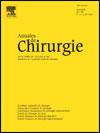Évaluation de la qualité de vie après chirurgie antireflux - 01/01/00
Riassunto |
But de l'étude : Évaluer la qualité de vie (QdV) des patients opérés pour reflux gastro-oesophagien (RGO).
Patients et méthodes : Cette étude prospective a porté sur 82 patients consécutifs soumis à une chirurgie antireflux entre octobre 1998 et janvier 1999. Pour évaluer leur QdV, un nouveau questionnaire a été utilisé : le gastrointestinal quality of life index (GIQLI) qui comporte 36 items portant sur cinq dimensions : les symptômes, la condition physique, les émotions, l'intégration sociale et le traitement médical. La série comportait 44 hommes et 38 femmes dont l'âge médian était 47 ans (extrêmes : 18-78). La QdV a été évaluée avant et six mois après l'intervention, avec un suivi de 94 % (77/82). Le score GIQLI pré- et postopératoire des patients opérés pour RGO ainsi que le score GIQLI enregistré dans un groupe contrôle de 110 sujets sains ont été comparés.
Résultats : Avant chirurgie, le score GIQLI (90 ± 23) était très inférieur au score (123 ± 13) du groupe contrôle (p < 0,001). Après chirurgie, une augmentation significative (p < 0,001) du score GIQLI (110 ± 23) a été observée mais celui-ci demeurait cependant statistiquement inférieur au score du groupe contrôle (p < 0,001). Le score postopératoire enregistré dans la dimension des symptômes était inférieur au score du groupe contrôle : 55 ± 11 contre 66 ± 6 (p < 0,001) alors qu'aucune différence significative n'était enregistrée dans les quatre autres dimensions. L'analyse statistique univariable révélait que le score GIQLI postopératoire (y) était significativement corrélé au score GIQLI préopératoire (x) selon la formule : y = 0,43 x + 71 (p < 0,001) ainsi qu'au sexe des patients, le score GIQLI postopératoire étant plus élevé chez les hommes (115 ± 19) que chez les femmes (103 ± 23) (p < 0,02).
Conclusion : La QdV des patients est fortement améliorée après chirurgie antireflux, mais n'atteint pas le niveau espéré chez un sujet sain. Une meilleure sélection des patients devrait permettre d'améliorer les résultats. Dans notre série, les patients de sexe masculin ou les patients ayant un score GIQLI préopératoire élevé sont les meilleurs candidats à une chirurgie antireflux.
Mots clés : fundoplicature ; qualité de vie ; reflux gastro-oesophagien.
Abstract |
Aim of the study: To assess the quality of life (QoL) of patients operated for gastroesophageal reflux disease (GERD).
Patients and methods: This prospective study included 82 consecutive patients submitted to antireflux surgery between October 1998 and January 1999. A new questionnaire was used to assess their QoL: the GastroIntestinal Quality of Life Index (GIQLI) that includes 36 items concerning 5 dimensions: symptoms, vitality, emotions, social relations and medical treatment. The series consisted of 44 men and 38 women with a mean age of 47 years (range: 18-78). QoL was assessed before and 6 months after surgery; the follow-up rate was 94% (77/82). The pre- and postoperative GIQLI scores of the study group and the GIQLY score of a control group of 110 healthy patients were compared.
Results: Before surgery, the GIQLI score (90 ± 23) was greatly impaired compared to the score (123 ± 13) observed in the control group (p < 0.001). After surgery, the GIQLI score (110 ± 23) increased significantly (p < 0.001), but remained statistically lower than the score of the control group (p < 0.001). The postoperative score recorded in the symptoms dimension was lower than the control group score: 55 ± 11 versus 66 ± 6 (p < 0.001), while no significant difference was observed in the other 4 dimensions. Univariate statistical analysis revealed that the postoperative GIQLI score (y) was correlated with the preoperative GIQLI score (x) according to the formula: y = 0.43 x + 71 (p < 0.001) and the sex of the patients, as the postoperative GIQLI score was higher in male patients (115 ± 19) than in female patients (103 ± 23) (p < 0.02).
Conclusion: The QoL of the patients was greatly improved after antireflux surgery, but remained lower than that of a control group of healthy subjects. Better patient selection should improve the results. In our series, male patients or patients with a high preoperative GIQLI score were the best candidates for antireflux surgery.
Mots clés : fundoplication ; gastroesophageal reflux disease ; quality of life.
Mappa
Vol 125 - N° 10
P. 948-953 - Dicembre 2000 Ritorno al numeroBenvenuto su EM|consulte, il riferimento dei professionisti della salute.


